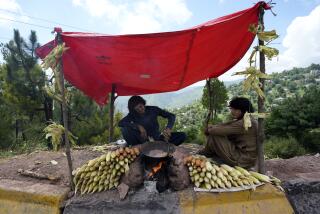S. Korea, IMF Wrestling With Details of Bailout
- Share via
SEOUL — As markets here continued to tumble, negotiators for South Korea and the International Monetary Fund worked overnight Monday to hammer out details of the terms for a massive financial bailout package for the country’s troubled economy.
The rescue plan will require Seoul to liquidate overextended financial companies, known here as merchant banks, and sharply lower its economic growth target for next year, state-owned television reported today. The package will total about $55 billion, KBS Television said.
The Finance Ministry today ordered nine of the weakest merchant banks to halt most operations immediately. They were told their business licenses will be suspended next year if they fail to increase their capital bases through mergers or other means of normalizing their operations, the Finance Ministry said.
The Finance Ministry did not explicitly link suspension of the merchant banks’ activities to the IMF package. It was not immediately clear whether the action was meant to fulfill IMF conditions or to head off even tougher measures desired by the IMF to shut down the banks more quickly.
Policy on troubled commercial banks appeared to be the key sticking point as negotiations drew near to a conclusion.
“We forced nine merchant banks to shut down their business. We won’t let commercial banks close,” Finance Ministry spokesman Chung Eui Dong told reporters today, before the morning talks concluded.
Korean media reported that the next step toward a final agreement was expected to be action by the IMF board in Washington, possibly later today. The plan would then go to the South Korean Cabinet.
In Washington, President Clinton said Monday that the United States should contribute to the bailout plan so long as the IMF package includes necessary South Korean economic reforms.
Clinton declined to say how much Washington might add to an IMF-led aid package. Korean media have reported that Japan and the United States together are expected to provide about $20 billion of the total package. A similar structure was used for an IMF-led rescue package put together for Indonesia in September. That deal was composed of about $23 billion from international institutions, plus credit lines of up to $17 billion from bilateral donors for use if needed. Washington promised $3 billion for the second-tier credits.
The Asian currency crisis was triggered by the devaluation of the Thai baht in early July. A $17.2-billion IMF bailout package was assembled for Thailand in August.
South Korea thus becomes the third nation to be rescued since the regional crisis began. The World Bank, which had been expected not to participate in the South Korean rescue, said Monday that it will. It offered no details.
Chi Jung Nam of The Times’ Seoul bureau contributed to this report.
More to Read
Sign up for Essential California
The most important California stories and recommendations in your inbox every morning.
You may occasionally receive promotional content from the Los Angeles Times.










